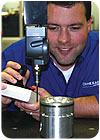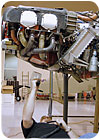
The business of manufacturing is a colossal world of outsourcing from product design to parts to services. This practice makes it possible to leverage expertise when you need it. In a field such as metrology where the difficulty of finding and training qualified staff remains an industry-wide issue, outsourcing is a growing nationwide trend.
No one disputes the fact that maintaining product quality is mission critical, but not every company is taking the same road to get there. Large and small manufacturers are hiring service providers for precision measurement, inspection work and process verification. And there are different flavors of service providers-the large OEM special services sector, privately owned regional players and small service shops.
Why Outsource?
The evolutionary shift in how quality control gets performed is due to the flexibility needed by manufacturers to survive in today’s competitive marketplace. And the reasons to outsource are as diverse as the companies that do so.First, the bustling metrology business is pouring new precision devices and product-specific functionality into the marketplace. Decades of software development has resulted in sophisticated inspection software that supports both computer-aided design (CAD) applications and true cross platform hardware integration. From lasers to white light sensing technologies, the growing number of metrology solutions can intimidate even an expert in the field.
For quality control managers, the technology challenge is twofold. The pressure is on to ensure their departments are using the best technology tool for the job at hand. Then, factor in the need to consistently train staff in the latest advances for one or several metrology devices. This effort becomes increasingly difficult for those departments with a small staff where all hands are needed to keep operations running smoothly.
In tough economic times, companies also are struggling to build optimization into their businesses in a responsible, budgetary way. Outsourcing can be a vital tool in this endeavor.
Tier one manufacturers are outsourcing large segments, or their entire quality control function, to keep costs and timelines under control. Often in larger corporations, quality control departments have separate budgets from the rest of the operation, which accommodates the process of outsourcing. Using outside expertise and equipment, they can sustain quality and find bottom-line savings by reducing the number of employees and the associated training and benefits involved.

Today’s quality managers are thinking outside the office cubicle. With access to alternative staffing solutions, the small or large manufacturing company can re-imagine how metrology factors into their operations today and further on down the road. Source: Hexagon Metrology
Supply and Demand
In the age of working smarter not harder, there is a supply-and-demand approach to quality control. Small and medium-sized businesses often lack the knowledge and qualified manpower, and tap into the on-demand metrology workforce when projects demand the know-how. With a deluge of precision devices supporting various levels of accuracy, the measurement expert can better ascertain what type of equipment and software is needed to get the job completed, and get the job done faster than a novice-in-training.John Wright, president of ADC Engineering (Gardena, CA) keeps his engineering staff focused on designing and building very large tools, such as assembly tools for wings and repair tools for helicopters. When it comes to inspection, Wright has found the best of both worlds-outsourcing the project to those with expertise in both the tool building business and laser tracker measurement. “Once the tooling is built, there are a lot of measurements that must be taken for these applications. Because this task is a small percentage of our production process, it is not cost-effective to hire a full-time employee for this task. Instead, I hire an expert to perform the inspection function.”
Street-wise manufacturing enterprises view outsourcing as a good way to augment their staffing when production ebbs and flows, or when they need help to complete a project with critical timelines. Other managers want to test drive more sophisticated equipment with higher accuracies and utilize skilled metrologists with product-specific expertise in 3-D measurement technologies. Alternatively, there is the QC manager who simply wants to perform due diligence on his internal quality control processes, and seeks non-partisan numbers from an outside expert who is impartial to the results of the project.
Coast Aerospace (Huntington Beach, CA) is a big proponent of using outside services for metrology work. The tooling company specializes in ground support equipment and major assemblies.
For in-house quality control, they employ three skilled laser tracker operators. “The reason why I outsource is because it doubles my output,” says Louis Ponce, president of Coast Aerospace. “I need to keep my staff busy in the plant without disruptions so we utilize outside metrology capacity for field operations at our customer sites, or in-house when it is needed. Outsourcing provides a huge value to a shop like ours.”
Meyco Machine & Tool (Fountain Valley, CA) has benefited in two ways from hiring temporary metrology specialists. Manny Gomez, Meyco president, explains, “Our company was contracted to build four large assembly tools for the wings of an airplane. This project required large volume measurement capability that could only be accomplished with a laser tracker. We hired outside experts to perform the task, and since then we have used them for additional inspection work. This experience enabled us to test drive the technology…to see how a laser tracker worked for our applications.”
Outsourced Mentoring
Another aspect of using outside expertise is outsourced mentoring.As an aging workforce of metrology specialists are steadily retiring, forward-thinking companies are taking steps to curb the problem. Manufacturers with metrologists-in-training programs still have dimensional control work that must get done. Department heads have turned to mentoring to develop their own experts by working closely with OEM specialists after the conventional training period is over.
Often this one-on-one teamwork between expert and novice results in very successful product implementations, where novices learn to use instrumentation properly, compare data acquisition results with an expert, and experience how processes are improved to produce parts faster and better.

In tough economic times, companies also are struggling to build optimization into their businesses in a responsible, budgetary way. Outsourcing can be a vital tool in this endeavor. Source: Hexagon Metrology
Who are the Players?
In a nutshell, there are three levels of service providers. The largest players in this arena are the OEM special services organizations with offices nationwide. Due to their research, development and production of metrology equipment, these companies nurture in-house experts who work closely with research and development and applications teams to develop, test and use the latest generation of measurement and inspection software and hardware. These factory-trained professionals are deployed across the country onto the customer’s shop floor for short-term and long-term projects.Regional metrology service providers tend to be small- to medium-sized companies that service clients in a particular geographic area near their headquarters or field offices. Their skilled staff may range from three to 15 employees with experience in particular metrology devices, industry-specific applications, and small or large volume measurement work. Depending on their capital equipment budgets, their in-house stock of metrology equipment will range from standard to state-of-the-art instrumentation.
The small, local metrology services business has one or two employees and works with manufacturers in their backyard. These hired guns have amassed industry expertise in industry-specific applications such as aerospace, automotive or shipbuilding. Recognizing the increased demand for metrology services, they have built a client list that fit their expertise profile. Metrology equipment will vary from shop to shop, and some companies rent their equipment as needed from OEMs or third-party rental agencies.
The Right Outsourcing Partner
Choosing the right outsourcing partner can depend on a variety of factors such as budget, timelines, logistics, availability, scope of project, required accuracies, metrology equipment, product-specific expertise and application knowledge. The quality control manager will weigh all of these aspects and forge a team to accomplish the project at hand. And the temporary worker-the hired expert or experts-must hit the ground running.Case in point: Direct Drive Systems (Cerritos, CA) produces high-speed, high-power permanent magnet motors and generators. Henry Towers, senior quality engineer, has unique needs for inspection. “Our rotors are highly magnetic, so we cannot use a standard CMM [coordinate measuring machine] for inspection. Instead, we hire experts proficient in the use of laser trackers. In three to four hours, they gather the required coordinate data, perform post processing and typically deliver the data the next day. From there, we generate our own surfaces and map any deviations from the cylindricity of the rotors, and check for other possible variations. It is simply more convenient and cost-effective to outsource the work.”
There are circumstances where the larger OEM special services organizations have the edge. OEMs typically have the most expertise in executing large complex projects, or projects with applications requiring a high level of multi-tiered expertise. These factory-trained experts launch and integrate their new technologies into a wide scope of manufacturing environments and software platforms, and work closely with clients to develop automation and verification processes around their products. The OEM also maintains a comprehensive, calibrated hardware repository and does not need to pigeonhole metrology equipment or software for the job at hand.

Small and medium-sized businesses often lack the knowledge and qualified manpower, and tap into the on-demand metrology workforce when projects demand the know-how. Source: Hexagon Metrology